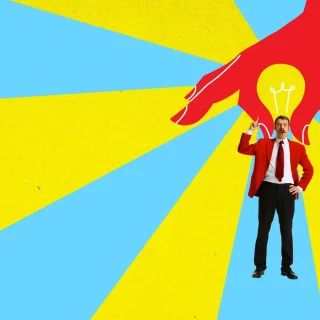What are your company’s mission, history, and reasons for being in business? Where did the inspiration come from? And who are the main characters in your brand storytelling? Moreover, do your customers know the “why” of your story? If not, could video be the best way to demonstrate your good intentions and build trust with the target audience?
Video storytelling, done well, is the ultimate SMB and B2B content marketing tool. Audiovisual components draw in viewers, hold their attention, and connect with them at an emotional level. It’s why social media users share online videos 1200% more than text and images combined. Video storytelling also makes a brand more memorable. Studies show that people can recall 95% of a video message, compared to only 10% from reading text[1].
This piece examines how a well-shot and carefully edited video encapsulates your brand message. You will see how effective this medium is for showcasing your story to current customers, clients, and prospects in 2023 and beyond.
The Power of Video Storytelling for SMBs
There are good reasons for why you should use video marketing as a medium to strengthen your company’s brand. First, audiovisuals help create a personality for your brand that comes across as authentic and purposeful to viewers. And, according to a 2022 video marketing survey by Wyzowl, 62% of marketers now deem video engagement the top metric. That’s because it increases your online presence better than all the other channels combined [2].
What Brand Storytelling Is NOT
Knowing what brand storytelling is not will stop you from approaching campaigns from the wrong angle. It’s not a monologue on the personal life of Bill, the company founder. Such stories won’t capture the attention of first-time viewers. Nor are brand stories directly about your brand, the products you sell, or the services you offer.
| Around 86% of companies now use video as an effective marketing tool[3]. |
What Brand Storytelling Is
The most compelling video presentations are entertaining and authentic, and they hold the viewer’s attention to the end. A convincing brand story puts your clients or customers firmly in the limelight. In other words, the target audience is the main character in the video’s narrative. Your message creates a value-driven connection between them and your brand. But your story must resonate with the viewer and their journey to achieve these aims.
Customer Profiles and Buyer Personas
Businesses struggle most when they lay more emphasis on sales than on the target buyer. In contrast, those that focus on the ideal customer tailor their content marketing strategies directly to the target group. Thus, brand storytelling using video is hit-and-miss unless you target it at specific customer profiles or buyer personas.
Creating customer profiles and buyer personas requires data collection and analysis. Read how Identifying Your Ideal Customer Will Make You More Profitable to learn more.
The examples below break down the basic data for each category.
Sample Customer Profile Accountability
| Description | Example |
| Business Industry Size Annual turnover Geography | Phone accessories Manufacturing 350+ employees Seven million North America |
Sample Buyer Persona
| Description | Example |
| Occupation/position Industry vertical Decision maker? Goals Challenges How can YOU help? | Production manager Telecommunications Yes Increase production Finding skilled workers Source top talent |
Why Your Video Audience Matters
The power of stories for SMB marketing lies in how the narrative draws an audience and taps into the senses. That’s why every successful brand story centers around knowing the viewer.
This audience-first approach is very different from the push advertising that turns people off. Instead, video storytelling attracts viewers by adding a more meaningful dialogue to digital interactions. By building a persona around your brand, you get to convert a target audience to customers without the hard sell.
Proprietary Branding for SMBs
Bold Entity’s proprietary branding process digs right into the very heart of who your company is and why clients love you. Our professional team of digital marketing experts draws inspiration from your company’s essence to strengthen your brand identity. It’s how Bold Entity crafts meaningful, visually engaging brand stories that tap into the emotions of your target buyers.
Discover How Bold Entity’s Proprietary Branding Can Help Your Business Thrive
Brand Storytelling Offers Solutions
A successful video tells your story through the lens of its target audience. Therefore, it must recognize the viewer’s needs, wants, and expectations. Only then can you offer targeted solutions to the challenges and pain points preventing them from reaching their goals.
This table shows typical examples of customer/client pain points.
| FINANCIAL | PROCESS | PRODUCTIVITY | ACCOUNTABILITY |
| Out-of-control spending Overpriced products High-priced services Unclear spending | Complicated methods Time-consuming tasks Hard-to-use products Lack of automation | Lack of streamlining Poor communication Time wasting Weak reporting | Slow response times Limited support options No self-serve support Lack of knowledge |
So, your brand story speaks the same language as the target viewer. It solves problems by answering questions related to specific challenges and pain points.
Now let’s go over the three basic steps for creating a compelling brand storytelling video.
#1 Outline Your Narrative
Take time to script your story before creating the video for your brand. It must check the following four boxes if it’s to capture a target viewer:
- Problem-based
- Unique
- Emotional connection
- Honest
Keep Your Brand Storytelling Linear
Start with a solid introduction to set the stage for what’s to come. Your intro must introduce the protagonist (leading character) or brand hero from the outset. The protagonist shares the beliefs, core values, and truths that resonate with your target audience, not the whole marketplace. Your narrative introduces the problem and expands on a crisis chock-full of obstacles. Only then should your story offer the perfect resolution to hook the viewer.
Point to Note: Non-linear narratives can work in some instances of brand storytelling, but these are more complex scripts. So, for now, focus on the linear narrative.
GoPro | Fireman Saves Kitten — Be a HERO
The Fireman Saves Kitten video by GoPro is an excellent example of brand storytelling. At no point does it mention the new camera or talk about its best features. Instead, it uses a linear narrative to tell a riveting story without so much as a voiceover. It’s a carefully produced point-of-view look at what the brand can offer both existing customers and prospects.
| Today, 83% of internet users in the US access digital video content each year[4]. |
#2 Keep Your Script Concise and Relatable
It only takes a few seconds for online users to get bored and hit the scroll wheel. So avoid the trap of fancy scripts and industry jargon, instead keeping things concise and relatable. Remember, no internet user will ever complain that your video is too easy to grasp.
With your pre-production sorted, it’s time to take your project into production.
#3 Lights, Camera, Action

Website video production takes resources, including hardware and editing software to control visuals, audio, and lighting. The resources you need depend on your needs and expectations. It’s easy to find affordable video production software online and inexpensive camera equipment. Even some smartphones produce high-quality videos, but avoid their tinny-sounding inbuilt mics. Free video editing tools can also be great for learning purposes.
| Brand storytelling boosts the value of company products by up to 2706%[5]. |
Brand Video Marketing Tips
Cinematic-quality footage takes practice and skill to create and edit. That’s why some SMB owners prefer to use a professional digital marketing agency. However, not all agencies are equal, so it pays to do research and due diligence before committing.
Here are seven other considerations for creating compelling video for your brand story.
- Shooting location: Will you record your footage in a studio, at your business, or outside?
- Technical aspects: What kinds of lighting, lenses, and camera angles will you use?
- Actors/voiceover artists: Will you source professionals or amateurs?
- Special effects: What other audio and/or visual tools will you need?
- Production crew: Will you hire a camera operator/videographer, director, sound mixer, etc.?
- Lighting technician: Do you need a gaffer to handle the on-set electrical factors?
- Video editor: Who will be responsible for post-production?
Start with a basic project to get a feel for videography and learn from your mistakes. It’s cheap to experiment using free tools and camera phones. Whatever you do, encourage plenty of constructive feedback from your employees and stakeholders. With the right tools and a little practice, you’re sure to kick out a compelling storytelling video that will earn your brand new devotees.
Experienced Brand Storytelling Experts
Do you have a brilliant storytelling idea but are unsure how to best execute it?Maybe you lack the people and resources needed to commit? Bold Entity is an expert digital marketing agency and a single-point, do-it-all partner for companies just like yours. We deliver your narrative to the target audience with emotionally engaging video content that addresses precise pain points. Let our expert marketers tell your brand story by creating cinematic-quality content using the latest tools and techniques.
Contact Bold Entity to Learn More About Our Video Marketing Services for SMBs
Brand Storytelling Closing Comments
You now know why compelling storytelling videos help make your company brand memorable. The human brain recalls critical points of a good video story much easier than a list of features. And brand storytelling helps forge emotional connections with people on a deeper level than any other media. As a result, companies that master the art of video storytelling bring in more sales and repeat business than push advertising ever could.
There’s a lot of room for creativity in videomaking, so be open to experimentation. Remember to invite feedback from your coworkers and marketing team. It won’t take long to get an idea of which production tools and processes you need to tell your story well.
Resource Links








